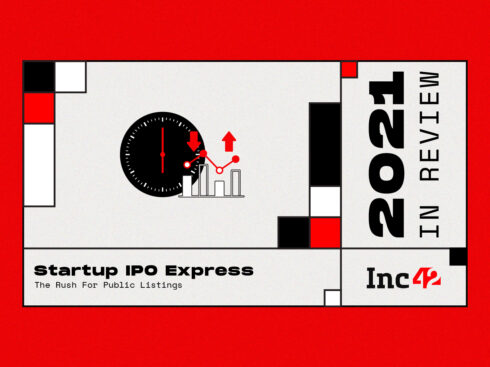SUMMARY
The demand has come after SEBI’s consultation paper on DVRs published last month
SEBI had proposed a sunset clause of 5 years for promoters to prevail DVRs
IndiaTech demands the clause to be increased to 15 years
Backed by MakeMyTrip founder Deep Kalra and Ola founder Bhavish Aggarwal, consumer internet advocacy group IndiaTech has proposed a sunset clause of at least 15 years, with an extendable five-year period with shareholder approval, for company promoters to retain differential voting rights (DVRs) after IPO (Initial Public Offering).
Speaking to Inc42 IndiaTech.org chief executive Rameesh Kailasam said he is against the sunset clause in general. “However, for the argument of checks and balances for corporate governance, we have proposed a period of 15-20 years after an IPO for shares with superior rights / DVRs. We need some adequate time for the founders to establish and run the show. This is significant for the growth of the company, in terms of operations, maintaining profitability and best serving its investors,” Kailasam added.
While IndiaTech had submitted a whitepaper pertaining to the DVRs to SEBI a few months back, the latest proposal has been made after SEBI’s consultation paper released on March 20, 2019, on the ‘Issuance of shares with Differential Voting Rights’ and asked for feedback from the stakeholders.
According to SEBI’s DVRs – Group Report, the sunset clause is limited to five years, and the superior voting rights (SR) shares shall get converted into ordinary equity shares on the 5th anniversary of the listing of the ordinary shares of the company. The validity of the SR shares can be extended by another five years with the approval of shareholders by way of a special resolution at a general meeting where all members vote on the one-share-one-vote basis, irrespective of the nature of their shareholding.
Further, the report says the SR shares shall get compulsorily converted into ordinary equity shares in the event of a merger or acquisition of the company, or whenever these are sold by the identified promoters who hold such shares, or in the case of demise of the promoter(s). Transfer of SR shares amongst promoters or persons of the promoter group(s), even though they are inter se transfers between persons acting in concert, shall not be permitted.
Asked whether such a clause will discourage investors, Kailasam said,
“There is no such clause in US, Hong Kong and many other countries. It did not discourage the investors there. Therefore, there is no reason to worry about investments in India as well. In fact, investors will be more than happy to invest in those companies where the founders are running the companies.”
According to an ET report, the Prime Minister’s Office (PMO) is keenly involved in the development and had organised a meeting in March to seek recommendations from various stakeholders. Presided over by Nripendra Misra, principal secretary to the prime minister, the meeting was attended by Niti Aayog CEO Amitabh Kant, SEBI chairman Ajay Tyagi and Hiren Joshi, an officer on special duty, for communications and IT in the PMO.
SEBI’s Consultation Paper: What IndiaTech Wants SEBI To Change
Besides the validity of shares with superior rights, there are numerous other factors, where IndiaTech has asked SEBI to relook into.
Exemption: The consultation paper does not contemplate any exemptions for HGTCs i.e a company using technology, internet or IP, or is involved in developing technology or IP and which has been in existence for a period of 4 years or more; and which has consolidated gross revenues of not less than Rs. 500 Cr. This non-exemption also includes the requirement that promoters (founders) must hold at least 20% of the post-issue capital.
IndiaTech stated that in case of HGTCs, SEBI should consider exempting the promoters (founders) from complying with the minimum promoters’ contribution requirement. That’s because practically speaking, when HGTCs reach a critical mass anywhere in the world, usually the promoter holding stands below 20%.
Issuance: The SEBI DVRs – Group Report permits the issuance of SR shares only to the promoter (founder) of an unlisted company, provided the SR shares have been held for more than one year prior to filing the draft offer document with SEBI. After this duration, it does not permit the subsequent issue of SR Shares. IndiaTech has recommended that the requirements for a one year wait prior to the filing the draft offer documents be altered to a period of three to six months. Further, it contends that the split and subdivision of SR shares in smaller or larger denominations in terms of voting rights should be allowed for SR shares.
Conversion: IndiaTech wants the transfer of shares amongst the promoters (founders) to be allowed without conversion. This will help in cases where a cofounder is leaving after handing over the management to the continuing founder, and similarly in cases where a settlement is taking place between two or more promoters who belong to the same family. As the SEBI proposal says that SR shares shall not be traded except upon conversion, IndiaTech’s proposal asserted that there is no point getting them listed as such and that the underlying shares should rather be mandatorily listed upon conversion.
Share Cap: SEBI’s proposal says that cap on shares with DVRs remains unchanged at 26% of the post-issue paid-up equity share capital. IndiaTech’s proposal, instead, says “We strongly recommend increasing the current cap on shares with DVRs from 26% to above 51% of the post-issue paid-up equity share capital.”
DVRs Under Existing Regulation
Currently, the issuance of DVRs is governed under Section 43(a)(ii) of the Companies Act, 2013, according to which a company incorporated under the laws of India and limited by shares is permitted to have equity shares with differential voting rights as part of its share capital. The differential rights appended to such equity shares may be with respect to dividends, voting (higher or lower) or otherwise. Such equity shares may be issued by a company as per Rule 4 of the Companies (Share Capital & Debentures) Rules, 2014 prescribed under the Companies Act, 2013.
However, the DVRs – Group report observed that in India, the current regulatory regime does not permit DVRs with higher or superior voting rights. Subject to certain conditions, DVR shares with lower voting rights are permitted. DVR shares with lower voting rights may be of some interest to small shareholders as dividend yield and capital appreciation rank higher than voting rights in their investment decisions in all likelihood.
It was also observed that DVR with lower voting rights shares are typically priced lower at issuance and offer higher dividends; in return, the voting rights are limited.
In the existing structure, DVRs have not been popular among companies. Only five companies — Tata Motors, Pantaloon Retails, Gujarat NRE Coke Ltd, Jain Irrigation and Stampede Capital — have issued DVRs so far.
Issuance of DVRs has been critical and essential for founders to keep their control in their company. For instance, Facebook has issued Class A shares which carry one voting right, Class B shares which carry 10 votes each. The Class B shares are held by Mark Zuckerberg and affiliates with no sunset clause. Unfortunately, under the existing regulations, Indian founders simply don’t have this choice.



























